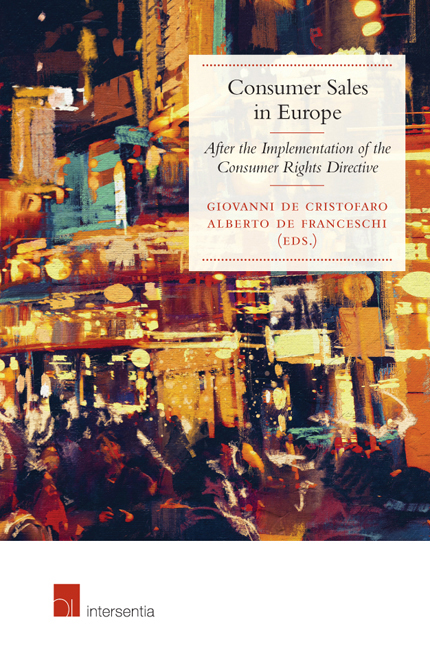Portugal
Published online by Cambridge University Press: 19 September 2018
Summary
THE IMPLEMENTATION OF DIRECTIVE 2011/83/EU
FRAMEWORK
Portugal transposed the Consumer Rights Directive (CRD) through two separate legislative Acts: one concerning distance and off-premises contracts and the other applicable to all consumer contracts.
Decree Law 24/2014, 24 February 2014 (Decreto-Lei no. 24/2014, de 24 de fevereiro) approved the new Distance and Off-Premises Contracts Act (DOPCA), which entered into force on 12 June 2014, repealing the former DOPCA. The first three provisions specify the subject matter of the Act, its scope and the relevant definitions. Section II (Articles 4–21) defines the legal regime applicable to distance and off-premises contracts. Sections III and IV (Articles 22–28) contain provisions on other categories of contracts, such as contracts concluded by means of automatic vending machines or automated commercial premises or inertia selling. Article 29 states the imperative nature of the Act. Sections V and VI (Articles 30–35) deal with remedies, penalties, measures to inform consumers and traders about the Act and alternative dispute resolution mechanisms available to the consumer. The Act ends with provisions concerning the repeal of former statutes and its entry into force.
Subsequently, through Law 47/2014, 28 July 2014 (Lei no. 47/2014, de 28 de julho), a few changes were introduced to the DOPCA, as well as to the Consumer Protection Act (CPA) (Lei no. 24/96, de 31 de julho), with the transposition of Articles 5 and 18 to 22 of the CRD. The CPA applies to all consumer contracts, while the DOPCA is lex specialis applying only to distance and off-premises consumer contracts. Information requirements can be found in Article 8 CPA. The new Articles 9A, 9B, 9C and 9D deal with additional payments, delivery, passing of risk and communication by telephone. Law 47/2014 only entered into force on 29 July 2014.
USE OF OPTIONS
Although the CRD prevents Member States from maintaining or introducing in their national laws provisions that diverge from those laid out in the CRD, including more or less stringent provisions, to avoid a different level of consumer protection (Article 4 CRD), the CRD leaves the Member States with areas in which they can opt for particular regulatory choices.
- Type
- Chapter
- Information
- Consumer Sales in Europe , pp. 143 - 162Publisher: IntersentiaPrint publication year: 2016



